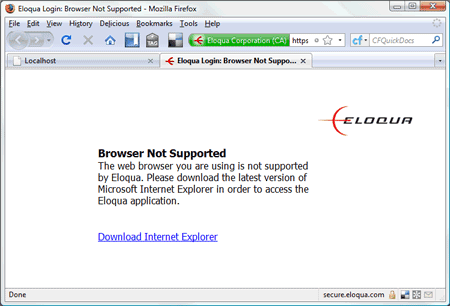Why is My Browser NOT Supported?
I don't know about you, but whenever I run into a "Browser Not Supported" message, I just start to growl. Here's a screen grab of one I ran into this morning from Eloqua.com.

Um, yeah, here we are, coming into the year 2009 and there are still several companies in the marketplace that throw "Browser Not Supported" messages to the end user. It's not like I'm using some antiquated, or completely custom browser either, I'm using Firefox here. This is not what I call user friendly, especially for a company that tracks user behavior, among other services. I'm quite surprised by this. Am I alone here?


Comments
Actually, I went to the Eloqua site to log in. So this had nothing to do with user behavior tracking per se. To the best of my knowledge, Firefox _does_ support ActiveX.
But that's not the point either. My point is that with all of the technologies available today, there's no reason we, as developers, should have to _force_ someone to use one browser over another.
Sure, maybe the reports and such might be built on top of the .NET framework, but there are better ways to handle the incompatibilities between browsers rather than just throw a "Browser Not Supported" message to the end user.
It seems that these "messages" appear most often when a site has been developed by .NET developers (check the .aspx extensions). It also seems to me that the majority of .NET developers I've met give little, if any, regard to usability and care even less about cross-browser testing, etc. The people I've met just like to drop the built-in controls onto the page, tie them to a database and move on.
The only way for Firefox to run ActivX controls is via a plugin (http://support.mozilla.com/en-US/kb/ActiveX), so my thought was that instead of having to field questions all day about why their app doesn't work in someone's browser, they just chose to place the "Not Supported" message.
Thanks for the clarification.
Guess I forgot I had already installed an ActiveX plugin for Firefox at some point.
I'm sure you would agree that users shouldn't be prevented from proceeding simply because they _may_ have to install another plugin ... otherwise, no one would develop in Flex, Flash, Java, or even Silverlight for that matter.
I would most definitely agree that you should have alternative ways of allowing users to still utilize your application, even if they do not have or choose not to install, a particular plug-in. I also think that choosing a technology such as Flash would be a much better solution as you have so much a of a greater install base, not to mention the cross-browser/cross-OS benefits. But that is a whole other conversation. 8- )